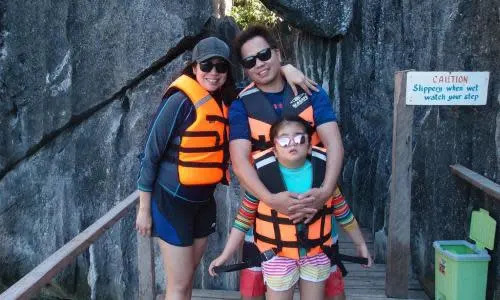HOW COME SG INC NEVER INVITE THIS TALENTED FAMILY TO CREATE JOBS HERE????
New Zealand denies entry to autistic daughter of immigrant couple
Tess McClure in AucklandTue, 26 April 2022, 11:59 am·3-min read

A 12-year-old autistic girl from the Philippines has been barred from moving to New Zealand with her parents under immigration policies that reject people with disability or illness who may present a high cost to the health system.
The rules have been called “discriminatory” and “ableist” by advocates calling for reform.
Arianna Alfonzo, 12, has had to remain in the Philippines for the past six years while her father, Allan, works in Christchurch where he has a carpet-laying business. Both he and Arianna’s mother, Gail Alfonzo, have residency status in New Zealand. But Arianna’s applications to come to New Zealand have been denied.
The case, first reported by the New Zealand Herald, is one of hundreds rejected under New Zealand’s rules, which set a $41,000 limit over five years on an immigrant’s cost to the health system. The criteria exclude people with a number of “high-cost” conditions including physical disability, intellectual disability, autistic spectrum disorders, brain injury, multiple sclerosis and cancers.
Arianna’s mother, Gail Alfonzo, said the family had spent thousands on specialists and lawyers to try to prove their family unit would not be a burden on New Zealand. She wrote in a public plea for support that her husband “is a hardworking person and trustworthy, he is a good citizen and abides by New Zealand law. We are in our early 40s and we are very sure both of us will contribute [to] the growth and economy of New Zealand.”
“Like any other child, Arianna deserves to live with dignity and be treated fairly,” she said. “Arianna deserves to have a complete and happy family.”
The New Zealand Green party MP Ricardo Menéndez March, who has advocated for the Alfonzo family, called the system “a deeply dehumanising process which strips them of their human rights and makes them plead in the media and to MPs to simply be seen as the whole human beings that we all are”.
March said he was aware of about 400 residency visas that had been declined on the basis of people not meeting the health conditions. “In my view, New Zealand is far behind some comparable jurisdictions,” he said.
March said he had written to the associate immigration minister Phil Twyford asking him to reassess the Alfonzo case. That request was denied. A spokesperson for Twyford’s office said he was not able to comment on individual cases.
The Alfonzo family is not the first high-profile case of prospective immigrants being rejected for their disability. Juliana Carvalho was initially rejected on similar grounds – she has lupus and is paraplegic. Carvalho spent seven years challenging the decision, and said it took an enormous toll.
“Honestly the emotional toll was worse than becoming paraplegic, in terms of mental health and suffering … This whole messaging that all you are [is] a burden, that you add no value – it has a huge impact on someone’s life,” she said. After beginning her time in New Zealand under a student visa, it took six years before Carvahlo was approved for residency.
“I am a very resourceful person with amazing friends, family, I have the support, and for me it was almost unbearable,” Carvalho said. “Now imagine for a child with a disability, who is building their identity – what is the impact of this messaging for children? And what is the impact of this messaging for all the other children with disabilities in this country?”
In 2021, Carvalho presented a 35,000-person petition to have the rules changed. This March, however, the government said it would not review the current criteria.
“The current settings are not specifically discriminatory against disabled people, but instead focus on assessing the public health impact an individual will have,” said a government statement.
“The government values the contribution that disabled people bring to society and is always willing to take steps towards making New Zealand a non-disabling society. However, as this goal pertains to the current Acceptable Standard of Health (ASH) immigration settings, the government considers these settings appropriate.”

